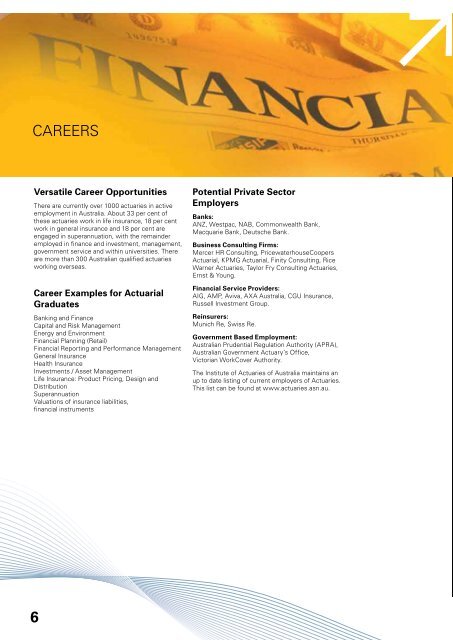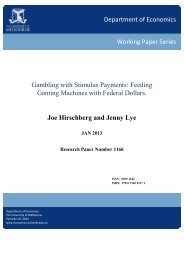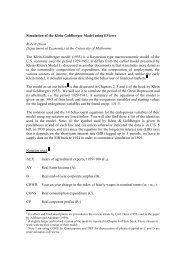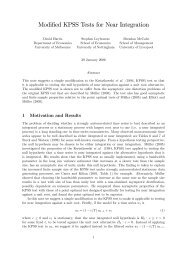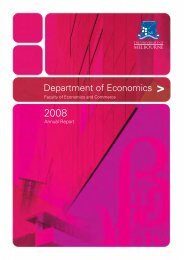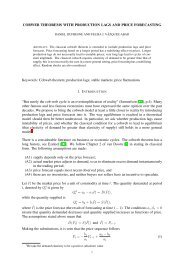Undergraduate Studies in Economics Undergraduate Studies in ...
Undergraduate Studies in Economics Undergraduate Studies in ...
Undergraduate Studies in Economics Undergraduate Studies in ...
You also want an ePaper? Increase the reach of your titles
YUMPU automatically turns print PDFs into web optimized ePapers that Google loves.
careers<br />
Versatile Career Opportunities<br />
There are currently over 1000 actuaries <strong>in</strong> active<br />
employment <strong>in</strong> Australia. About 33 per cent of<br />
these actuaries work <strong>in</strong> life <strong>in</strong>surance, 18 per cent<br />
work <strong>in</strong> general <strong>in</strong>surance and 18 per cent are<br />
engaged <strong>in</strong> superannuation, with the rema<strong>in</strong>der<br />
employed <strong>in</strong> f<strong>in</strong>ance and <strong>in</strong>vestment, management,<br />
government service and with<strong>in</strong> universities. There<br />
are more than 300 Australian qualified actuaries<br />
work<strong>in</strong>g overseas.<br />
Career Examples for Actuarial<br />
Graduates<br />
Bank<strong>in</strong>g and F<strong>in</strong>ance<br />
Capital and Risk Management<br />
Energy and Environment<br />
F<strong>in</strong>ancial Plann<strong>in</strong>g (Retail)<br />
F<strong>in</strong>ancial Report<strong>in</strong>g and Performance Management<br />
General Insurance<br />
Health Insurance<br />
Investments / Asset Management<br />
Life Insurance: Product Pric<strong>in</strong>g, Design and<br />
Distribution<br />
Superannuation<br />
Valuations of <strong>in</strong>surance liabilities,<br />
f<strong>in</strong>ancial <strong>in</strong>struments<br />
Potential Private Sector<br />
Employers<br />
Banks:<br />
ANZ, Westpac, NAB, Commonwealth Bank,<br />
Macquarie Bank, Deutsche Bank.<br />
Bus<strong>in</strong>ess Consult<strong>in</strong>g Firms:<br />
Mercer HR Consult<strong>in</strong>g, PricewaterhouseCoopers<br />
Actuarial, KPMG Actuarial, F<strong>in</strong>ity Consult<strong>in</strong>g, Rice<br />
Warner Actuaries, Taylor Fry Consult<strong>in</strong>g Actuaries,<br />
Ernst & Young.<br />
F<strong>in</strong>ancial Service Providers:<br />
AIG, AMP, Aviva, AXA Australia, CGU Insurance,<br />
Russell Investment Group.<br />
Re<strong>in</strong>surers:<br />
Munich Re, Swiss Re.<br />
Government Based Employment:<br />
Australian Prudential Regulation Authority (APRA),<br />
Australian Government Actuary’s Office,<br />
Victorian WorkCover Authority.<br />
The Institute of Actuaries of Australia ma<strong>in</strong>ta<strong>in</strong>s an<br />
up to date list<strong>in</strong>g of current employers of Actuaries.<br />
This list can be found at www.actuaries.asn.au.<br />
Start<strong>in</strong>g on the Career Path<br />
To qualify as an actuary, a student must pass (or<br />
be exempt from) three parts of the professional<br />
accreditation as prescribed by the Institute of<br />
Actuaries of Australia (IAAust). The first two parts<br />
can be undertaken as a part of the Bachelor of<br />
Commerce (Honours) degree at the University of<br />
Melbourne.<br />
If you complete relevant subjects at the University<br />
of Melbourne, and perform sufficiently well, you<br />
will be recommended for exemption from the<br />
correspond<strong>in</strong>g subjects offered by the Institute<br />
of Actuaries of Australia. Should you receive<br />
exemption from all correspond<strong>in</strong>g subjects you will<br />
be exempt from both Part I and Part II by the end<br />
of your honours degree. Successful completion of<br />
Parts I and II of the IAAust requirements earns you<br />
the Associateship of the Institute of Actuaries of<br />
Australia (AIAA). However, if you do not obta<strong>in</strong> the<br />
mark needed to achieve exemption you do not need<br />
to repeat the subject. As long as you achieve a<br />
pass mark or above the subject will still be credited<br />
towards your Bachelor of Commerce degree.<br />
Part III of the professional accreditation is set<br />
by the Institute of Actuaries of Australia. These<br />
exam<strong>in</strong>ations are held <strong>in</strong> May and October each<br />
year and are undertaken after university, while a<br />
person is work<strong>in</strong>g full time.<br />
The length of time taken to qualify varies from<br />
student to student. The qualification can be<br />
achieved <strong>in</strong> a m<strong>in</strong>imum of five years, but the<br />
average time to ga<strong>in</strong> full accreditation is between<br />
seven and eight years.<br />
What Would I Study?<br />
At first year level students <strong>in</strong> the Centre for<br />
Actuarial <strong>Studies</strong> take <strong>in</strong>troductory subjects <strong>in</strong><br />
microeconomics and macroeconomics, account<strong>in</strong>g,<br />
mathematics and actuarial studies. These subjects<br />
provide a foundation for your future studies. They<br />
also serve to give you a knowledge of the general<br />
economic and bus<strong>in</strong>ess environment <strong>in</strong> which<br />
actuarial problems are found. At second year level<br />
you will take subjects <strong>in</strong> probability and statistics.<br />
These two subjects are fundamental to your future<br />
success <strong>in</strong> actuarial subjects and will give you the<br />
confidence to model random phenomena us<strong>in</strong>g<br />
mathematical techniques.<br />
Dur<strong>in</strong>g your second year you will also take two<br />
subjects <strong>in</strong> f<strong>in</strong>ancial mathematics. In these subjects<br />
you will learn how to model the expected cash<br />
flows that arise from a variety of f<strong>in</strong>ancial contracts<br />
<strong>in</strong>clud<strong>in</strong>g loans, bonds and basic <strong>in</strong>surance<br />
contracts. You will also learn how to account for the<br />
uncerta<strong>in</strong>ty <strong>in</strong> future earn<strong>in</strong>gs rates and projected<br />
cash flows. Your second year of study will also<br />
<strong>in</strong>clude subjects <strong>in</strong> <strong>in</strong>termediate macroeconomics<br />
and bus<strong>in</strong>ess f<strong>in</strong>ance.<br />
Dur<strong>in</strong>g the first two years of study students will also<br />
take two non-mathematical subjects taught outside<br />
the Faculty of <strong>Economics</strong> and Commerce to satisfy<br />
the breadth component of the BCom degree.<br />
The third year of the actuarial program is the most<br />
highly prescribed with seven actuarial subjects to be<br />
studied. The subjects you will take <strong>in</strong> your third year<br />
form the backbone of your technical tra<strong>in</strong><strong>in</strong>g as an<br />
actuary. The third year subjects cover the technical<br />
side of pric<strong>in</strong>g and valuation for both life <strong>in</strong>surers<br />
and general <strong>in</strong>surers, the construction and use of<br />
life tables and survival models, and model portfolio<br />
theory. What you learn <strong>in</strong> your third year will set you<br />
apart from other Commerce graduates as you will<br />
beg<strong>in</strong> to appreciate what makes actuarial studies so<br />
unique and so valuable.<br />
A fourth year of study (Honours) is available to<br />
students who perform sufficiently well <strong>in</strong> their third<br />
year of undergraduate study. For more detailed<br />
<strong>in</strong>formation about the prestigious Honours year <strong>in</strong><br />
Actuarial <strong>Studies</strong> see page 11.<br />
6 7


